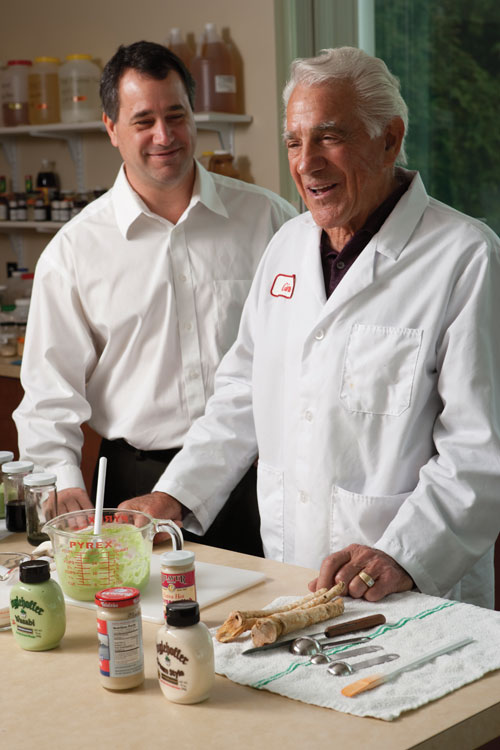 The $21 million Beaverton Foods empire was founded on Mama’s smarts, and her descendants are not resting on their hot and honey mustards.
The $21 million Beaverton Foods empire was founded on Mama’s smarts, and her descendants are not resting on their hot and honey mustards.
|
The $21 million Beaverton foods empire was founded on Mama’s smarts, and her descendants are not resting on their hot and honey mustards.
By Ben Jacklet/Photos by Stephen Funk
In 1929, the year the stock market crashed and the Great Depression began, Rose Biggi began grinding and bottling homegrown horseradish in husband Lui’s wine cellar in Beaverton.
The Biggis were Italian immigrants who came to Oregon for opportunity. They bought 14 acres for $3,500, baked their own bread, milked their own cows and canned their own fruits and vegetables. Their farmhouse had no running water. Their cash crop was horseradish.
Horseradish grew extremely well in Beaverton, but Rose Biggi never ate it. Truth be known, she simply did not like the way the stuff tasted. But she did like the taste of owning property and running a business, two opportunities she never would have had in her native Genoa. She recognized the root’s potential as a niche product, and before long she had found a local market through her friend Eva, the wife and business partner of Fred Grubmeyer, who later changed his name to Fred Meyer.
|
Her production equipment consisted of a grinder made for Parmesan cheese. She sold her product for 10 cents a bottle. Her first employee was Esther Troupe, who started as a babysitter at 15 cents an hour, got bumped to 25 cents for helping with the business, and ended up working for the family for 63 years.
Rose Biggi was an oddity in Beaverton, an independent woman with a sharp foreign accent running a business her way. She also distinguished herself as a born negotiator with a gift for getting what she wanted without hurting people’s feelings.
Her grandson, Domonic Biggi, vice president of the Beaverton Foods empire Rose built, still marvels at her business skills. “When someone wasn’t working hard enough for her, she’d say, ‘You a nice boy, you too nice and too smart to be here. You understand me?’ She always did it with a smile on her face. I had one guy tell me once, ‘It took me 20 years to realize that your grandmother fired me.’”
Her charm also came in handy when it came time to negotiate prices for raw materials, machinery and property. She kept her debts minimal and pursued bargains vigorously. Having come from a European economy racked with deflation, she understood the strategic value of investing in business and property. She built a processing plant on the family farm and invested in new equipment and farmland.
With time the Biggi family became a significant property owner in Beaverton, well- positioned to capitalize on the region’s urbanization. Movie theaters, restaurants and malls today pay rent to Rose’s descendants for properties the Biggis snapped up from farmers getting out of the business.
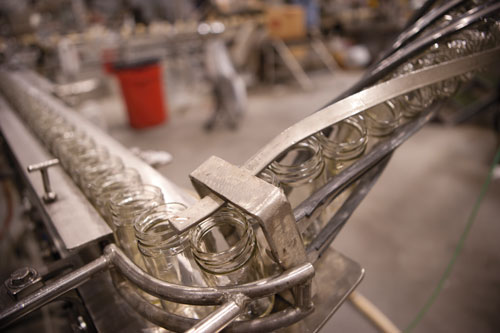 |
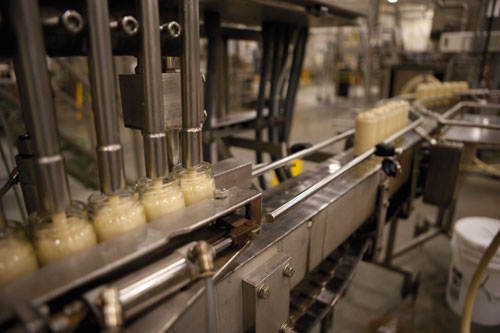 |
Beaverton Foods ships mustard and horseradish all over the country from its sole production plant in Beaverton. |
Rose died in 1995 at age 90, but her spirit lives on at the 80,000-square-foot headquarters of Beaverton Foods at the edge of the urban growth boundary in Hillsboro. There the 72-employee, $21 million company churns out 150 different condiments under a variety of labels including Beaver, Inglehoffer and Old Spice. Her son, 81-year-old Gene Biggi, who led the company’s foray into mustard, serves as president. Rose’s photograph is posted near the entrance to Beaverton Foods, along with a quote from her that sums up her attitude: “God grant us health and energy, and we’ll do the rest.”
Gene Biggi grew up immersed in the family business. He recognized that the key to its survival was the power of niche. But there’s only so much you can do with horseradish. How to build on that narrow specialty without straying too far from it?
Gene was eating at a Chinese restaurant when it came to him: Chinese mustard. He spoke with the chef and found out that restaurants had no easy commercial supply of ready-made hot mustard. Restaurateurs had to make their own mustard from mustard flour imported from China, and that took time and effort. Here was an opportunity and Gene exploited it methodically. Today, Beaverton Foods is the largest packer of hot Chinese mustard in the United States.
Gene was also the first person to develop honey mustard for the mass market. He says he simply followed his sweet tooth and his interests in the properties of honey and mustard until he came up with a tasty sweet mustard that hit the spot. “I had the market to myself for about 20 years,” he says.
Chinese hot mustard and honey mustard have been big hits for Beaverton Foods. But the most successful product Gene ever developed has been the recently developed Beaver brand Wasabi horseradish in a 12.5-ounce squeeze bottle. “It took me three summers to get the right formula,” he says, “But boy, did that take off. It took off like a rocket.”
Gene bought out the rest of the family to take control of Beaverton Foods in 1985. He resisted buyout offers to keep the business in the family, and in 2000 invested $8 million in the new plant in Hillsboro that increased production capacity tenfold.
The horseradish roots are piled high inside the sharp-scented horseradish storage room at the Beaverton foods plant. There are also vats of honey, sacks of mustard seed from Canada and boxes of garlic. Mechanized mustard guns on the production floor fill five-gallon tubs with honey mustard, squeeze bottles with wasabi horseradish and four-ounce glass jars with hot Dijon. The most recent experiment involves organic mustards under the Ingelhoffer brand.
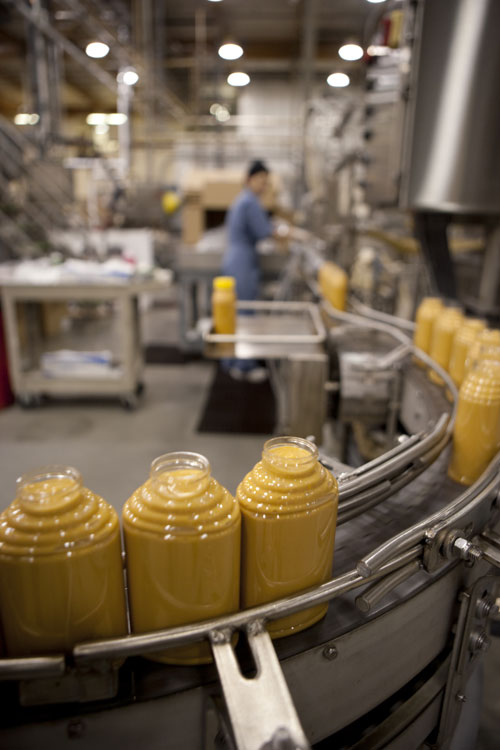 |
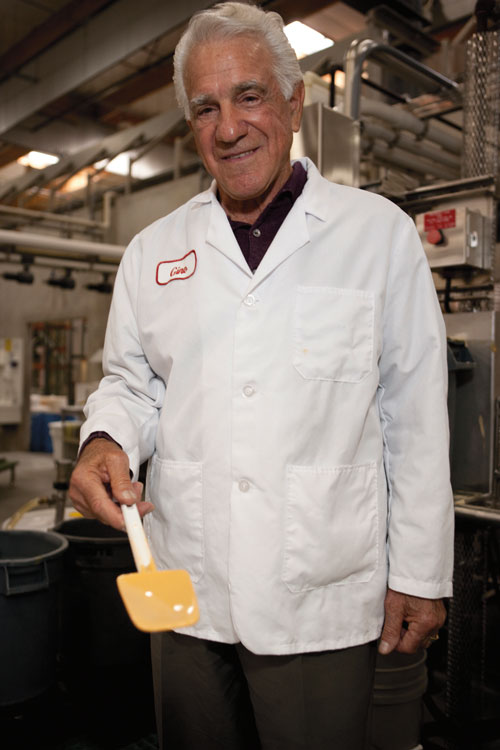 |
Mustard remains at the core of what Beaverton Foods produces. At a recent World-Wide Mustard Competition, it won eight awards. President Gene Biggi predicts continued growth. |
In addition to the 150 condiments Beaverton Foods creates, it also processes sauces and marinades for other companies using their recipes, most notably the “secret sauce” used at Bob’s Burger Express restaurants throughout Oregon. The company has also developed profitable partnerships with food producers such as HoneyBaked Ham, which are often sold with Beaver brand sweet champagne mustard.
The variety of labels in the tasting room shows that Gene Biggi and his team have been delving into a vast variety of salsas, salad dressings, marinades, sweet and sour sauces and other blends. But mustard and horseradish remain at the core of what the company does. At the most recent World-Wide Mustard Competition in Napa Valley, Beaverton Foods won eight awards, including gold medals for its Beaver Wasabi Mustard and Beaver Garlic Dijon. The company ranks third in mustard sales nationally, albeit a distant third, behind French’s and Grey Poupon.
It may seem like a logical enough evolution, from horseradish to mustard, but as Gene points out, it took a lot of work and strategic planning to get it right. Beaverton Foods is unusual in the food processing sector in that it can ship anywhere in the nation from its sole production facility and still make a profit. This success has not gone unnoticed. The buyout offers started in the 1960s with Heinz, and they have continued with Kraft, Smucker’s and “all kinds of Japanese companies,” Gene says. “I had them all trying to buy me out at one time or another. I came real close with Smucker’s. That was a pretty good offer. That was nine years ago, and my wife is still barely talking to me.”
Gene says that he has resisted selling for a reason. “If you can keep a family business in the family, you can get a product to market at a very competitive price,” he says. “Every time a company sells, either the quality has to go down or they have to raise prices. If you don’t sell you don’t have to do that. Beaverton Foods never sold. That’s why we beat the pants off of everybody.”
It also helps that food processing as a sector is faring better than the rest of Oregon’s economy. While manufacturing employment has plummeted by 13% statewide over the past year, food manufacturing has added 2,100 jobs, a 9.7% increase.
Gene predicts that growth will continue. “When unemployment hits 10%, you still have 90% of the people working,” he says. “They’re still eating, and they’re still spending money. Maybe they’ll make a sandwich instead of going out to a restaurant. But they’re gonna need to put some mustard on there.”
Still, the Biggis have been battling as independent Davids in a business landscape dominated by Goliaths for too long to take their success for granted, especially in a financial climate as challenging as today’s. Heir-apparent Domonic Biggi, who is 44, says Rose’s lessons come in handy these days, when credit is tight and cash-strapped buyers try to delay payments. “We’re watching our cash flow and we’re getting tough about nonpayment,” he says. “That was a big lesson grandma taught me, that you can be firm without being a jerk.”
The way Domonic sees it, the business fundamentals that enabled his grandmother to build the company amid the Depression will also help Beaverton Foods to power through the current downturn: know your customer, avoid debt, fix your mistakes and apologize for them, and embrace self-sufficiency.
“She set a beautiful foundation for us, and we have never strayed from it,” says Domonic. “Grandma never got a bailout during the Depression and we’re not getting a bailout now. She didn’t need one and we don’t need one.”


 Rose Biggi as Grand Marshall of the Beaverton Parade in 1982. She built her business on thrift, energy and savvy.
Rose Biggi as Grand Marshall of the Beaverton Parade in 1982. She built her business on thrift, energy and savvy.